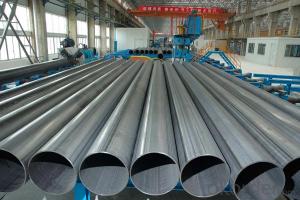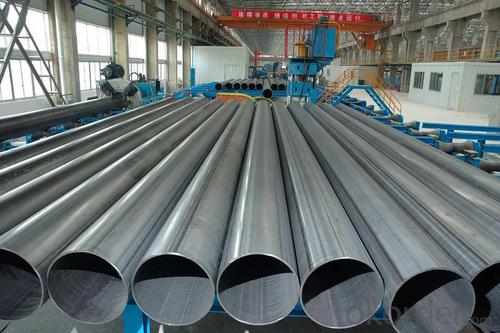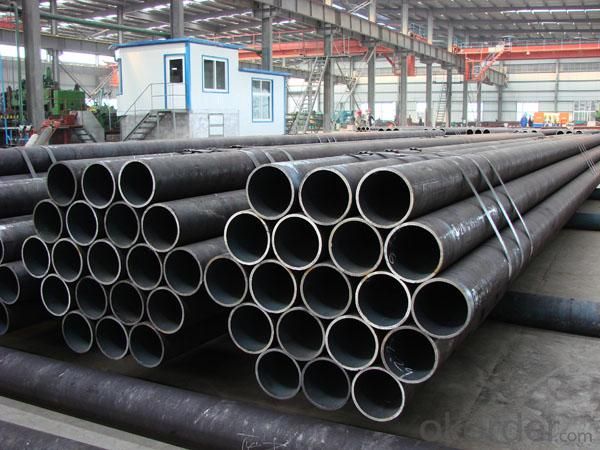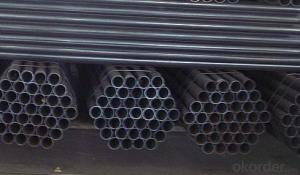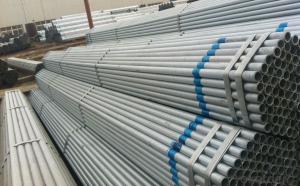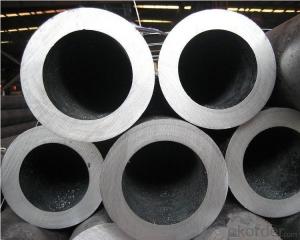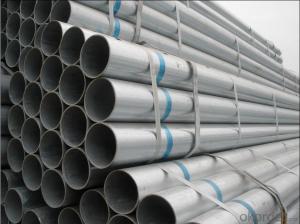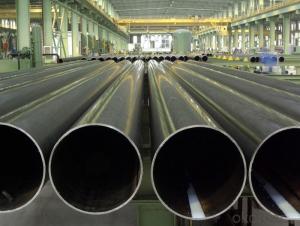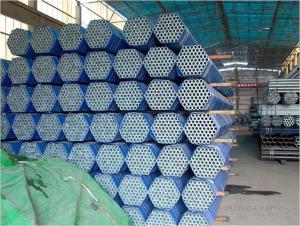Welded Steel Pipe BS1387 with Good Quality
- Loading Port:
- Tianjin
- Payment Terms:
- TT OR LC
- Min Order Qty:
- 25 m.t.
- Supply Capability:
- 10000 m.t./month
OKorder Service Pledge
OKorder Financial Service
You Might Also Like
1、Structure of Welded Steel Pipe BS1387 with Good Quality:
It is good quality produced with steel plate.
2、Main Features of the Welded Steel Pipe BS1387 with Good Quality:
• High manufacturing accuracy
• High strength
• Small inertia resistance
• Strong heat dissipation ability
• Good visual effect
• Reasonable price
3、Welded Steel Pipe BS1387 with Good Quality Specification:
Standard | GB, DIN, ASTM ASTM A106-2006, ASTM A53-2007 |
Grade | 10#-45#, 16Mn 10#, 20#, 45#, 16Mn |
Thickness | 8 - 33 mm |
Section Shape | Round |
Outer Diameter | 133 - 219 mm |
Place of Origin | Shandong, China (Mainland) |
Secondary Or Not | Non-secondary |
Application | Hydraulic Pipe |
Technique | Cold Drawn |
Certification | API |
Surface Treatment | factory state or painted black |
Special Pipe | API Pipe |
Alloy Or Not | Non-alloy |
Length | 5-12M |
Outer Diameter | 21.3-610mm |
Grade | 20#, 45#, Q345, API J55, API K55, API L80, API N80, API P110, A53B |
Standard | ASME, ASTM |
1) Material:20#(ASTM A 106/A53 GRB.API5LGRB,GB),45#,16Mn,10#.
2) Specification range:OD:21.3-610mm,WT:6-70mm,length:6-12m or according to the requirement of clients.
3) Excutive standards:GB,ASME API5L.ASTM A 106/A53,Despite of the above standards,we can also supply seamless steel pipe with standard of DIN,JIS,and so on,and also develop new products according to the requirements of our clients!
4) Surface:black lacquered,varnish coating or galvanized.
5) Ends:Beveled or square cut,plastic capped,painted.
6) Packing:bundles wrapped with strong steel strip,seaworthy packing.
4、Packaging & Delivery
Packaging Details: | seaworthy package,bundles wrapped with strong steel strip |
Delivery Detail: | 15-30days after received 30%TT |
5、FAQ of Welded Steel Pipe BS1387 with Good Quality:
①How is the quality of your products?
Our products are manufactured strictly according to national and internaional standard, and we take a test
on every pipe before delivered out. If you want see our quality certifications and all kinds of testing report, please just ask us for it.
Guaranteed: If products’ quality don’t accord to discription as we give or the promise before you place order, we promise 100% refund.
②How about price?
Yes, we are factory and be able to give you lowest price below market one, and we have a policy that “ for saving time and absolutely honest business attitude, we quote as lowest as possible for any customer, and discount can be given according to quantity”,if you like bargain and factory price is not low enough as you think, just don’t waste your time.Please trust the quotation we would give you, it is professional one.
③Why should you chose us?
Chose happens because of quality, then price, We can give you both.Additionally, we can also offer professional products inquiry, products knowledge train(for agents), smooth goods delivery, exellent customer solution proposals.Our service formula: good quality+good price+good service=customer’s trust
SGS test is available, customer inspection before shipping is welcome, third party inspection is no problem
- Q: What is the difference between API 5L and ASTM A53 steel pipes?
- API 5L and ASTM A53 are widely utilized carbon steel pipe standards with similar purposes but notable distinctions. 1. In terms of scope, API 5L pertains to seamless and welded pipes for transporting oil, gas, water, and other fluids. It encompasses plain-end, threaded-end, and belled-end pipe types. Conversely, ASTM A53 is a standard specification for seamless and welded black and hot-dipped galvanized steel pipes utilized in mechanical and pressure applications. 2. The manufacturing processes differ, as API 5L pipes undergo hot-rolling, while ASTM A53 pipes undergo either hot-rolling or cold-drawing. This variance affects the chemical composition and mechanical properties of the pipes. 3. Generally, API 5L pipes have a higher carbon content compared to ASTM A53 pipes. This discrepancy arises from the intended use of API 5L pipes for conveying oil, gas, and water, necessitating greater strength and durability. On the other hand, ASTM A53 pipes cater to mechanical and pressure applications, where lower carbon content is deemed appropriate. 4. API 5L pipes exhibit higher minimum yield strength and tensile strength than ASTM A53 pipes. This outcome stems from the increased carbon content and more stringent manufacturing process employed for API 5L pipes. Conversely, ASTM A53 pipes possess lower yield and tensile strength requirements, rendering them more suitable for general-purpose applications. 5. API 5L pipes offer various coating options, including black varnish, 3PE, FBE, among others, depending on the specific application requirements. In contrast, ASTM A53 pipes are typically hot-dipped galvanized to enhance corrosion resistance. In conclusion, API 5L and ASTM A53 steel pipes differ in scope, manufacturing processes, chemical compositions, mechanical properties, and coating options. The appropriate choice of pipe hinges upon specific application requirements, such as the nature of the conveyed fluid, operating conditions, and desired strength and durability.
- Q: Material of welded steel pipe
- GB/T14980-1994 (large diameter welded pipe for low pressure fluid delivery). Mainly used to transport water, sewage, gas, air, heating, steam and other low-pressure fluid and other uses. Its representative material is Q235 grade a steel.GB/T12770-1991 (stainless steel welded pipe for mechanical structure). Mainly used in machinery, automobiles, bicycles, furniture, hotels and restaurants, decorations and other mechanical parts and structures. Its representative material 0Cr13, 1Cr17, 00Cr19Ni11, 1Cr18Ni9, 0Cr18Ni11Nb and so on.
- Q: Are steel pipes suitable for wastewater treatment facilities?
- Steel pipes are indeed a suitable option for wastewater treatment facilities. These facilities commonly employ steel pipes because of their impressive strength, durability, and resistance against corrosion. Given that wastewater treatment facilities often deal with corrosive and abrasive substances, steel pipes have the ability to endure these harsh conditions. Furthermore, steel pipes come in various sizes and configurations, allowing for effortless installation and customization to meet the specific requirements of the facility. Moreover, if necessary, steel pipes can be easily repaired or replaced, ensuring the long-lasting and dependable nature of the wastewater treatment system. Ultimately, steel pipes are an appropriate choice for wastewater treatment facilities due to their strength, durability, corrosion resistance, and flexibility for installation and maintenance.
- Q: How are steel pipes used in the power generation industry?
- Steel pipes are widely used in the power generation industry for various purposes such as transporting fluids, gases, and steam, as well as for structural support and heat exchange. They are used in power plants for conveying cooling water, fuel, and exhaust gases, as well as in boiler systems for transporting high-pressure steam. Additionally, steel pipes are utilized for constructing heat exchangers, condensers, and other critical components, ensuring the efficient and reliable operation of power generation facilities.
- Q: How are steel pipes used in the manufacturing of conveyor systems?
- Steel pipes are commonly used in the manufacturing of conveyor systems as they provide a strong and durable structure for transporting materials. These pipes are used to create the framework and support structure of the conveyor system, allowing for the smooth movement of goods from one place to another. Additionally, steel pipes can be welded together to create longer sections, making them ideal for constructing lengthy conveyor systems.
- Q: How are steel pipes used in the manufacturing of boilers and heat exchangers?
- Steel pipes are used in the manufacturing of boilers and heat exchangers primarily for their excellent strength, durability, and heat resistance properties. These pipes are used to carry hot fluids and gases, such as water and steam, throughout the boiler or heat exchanger system. The steel pipes provide a reliable and efficient means of transferring heat and maintaining the desired temperature within the system. Additionally, their corrosion resistance ensures long-lasting performance, making them an essential component in the manufacturing of boilers and heat exchangers.
- Q: What is the size of seamless steel tube DN150?
- Seamless steel pipe having a hollow cross section, used as a conduit for conveying fluids, such as pipelines for transporting petroleum, natural gas, gas, water, and certain solid materials. Compared withsteel and roundsteelinsolid, flexural torsional strength in the same time, the weight is light, is a kind of economic section steel, widely used in the manufacture of structural parts and mechanical parts, such as the oil pipe, automobile transmission shaft, the bicycle frame and steel construction with scaffold with steel pipe manufacturing ring parts can be improved the utilization rate of materials, simplify the manufacturing process, material saving and working hours, has been widely used to manufacture steel tube.
- Q: How are steel pipes used in the construction of irrigation systems?
- Steel pipes are commonly used in the construction of irrigation systems due to their strength and durability. These pipes are used to transport water from a water source, such as a well or reservoir, to the desired areas for irrigation. They are often used in underground or above-ground applications, providing a reliable and efficient means of delivering water to crops or plants. Steel pipes are resistant to corrosion and can withstand high pressure, making them ideal for irrigation systems that require long-term functionality.
- Q: What is the difference between galvanized iron pipe and galvanized steel pipe? Or called different, in fact, is referred to as galvanized pipe?
- Seamless steel pipe material is steel, but also seamless, high strength, used in high pressure, harsh environment occasions. The galvanized pipe is only made on the steel tube, which is similar to the so-called antirust paint
- Q: What are the different types of steel pipe connections for fire sprinkler systems?
- There are three main types of steel pipe connections for fire sprinkler systems: threaded connections, grooved connections, and welded connections. Threaded connections involve screwing the pipes together using threads on the ends of the pipes. Grooved connections use grooves on the pipe ends and couplings with matching grooves to connect the pipes. Welded connections involve permanently bonding the pipes together using heat and a welding process. Each type of connection has its advantages and may be used in different applications based on factors such as pipe size, system design, and installation requirements.
Send your message to us
Welded Steel Pipe BS1387 with Good Quality
- Loading Port:
- Tianjin
- Payment Terms:
- TT OR LC
- Min Order Qty:
- 25 m.t.
- Supply Capability:
- 10000 m.t./month
OKorder Service Pledge
OKorder Financial Service
Similar products
Hot products
Hot Searches
Related keywords
